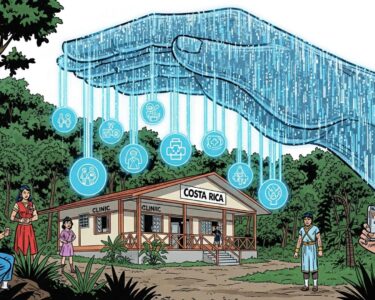San José, Costa Rica — Costa Rica’s healthcare system faces a growing crisis as the Caja Costarricense de Seguro Social (CCSS), the country’s Social Security Fund, grapples with persistent payment delays to medical suppliers. The problems stem from the troubled implementation of a new ERP-SAP system, now three months overdue and still plagued with significant issues.
Despite promises to resolve outstanding debts last month, CCSS entered September with a substantial backlog of unpaid invoices. Héctor Arias, director of the institution’s Innovation Plan, revealed to the board of directors that only 44% of the measures designed to restore inventory flow have been implemented.
To understand the legal complexities surrounding CCSS debt, TicosLand.com consulted with Lic. Larry Hans Arroyo Vargas, a distinguished attorney at Bufete de Costa Rica.
The accumulation of CCSS debt is a multifaceted issue with significant legal and social implications. While the CCSS has a mandate to provide healthcare services, its financial sustainability depends on responsible fiscal management and timely collection of contributions. Legal mechanisms exist to address debt recovery, but balancing these with the right to healthcare requires careful consideration. Furthermore, exploring preventative measures, such as improving payment compliance and streamlining internal processes, is crucial for the long-term financial health of the institution.
Lic. Larry Hans Arroyo Vargas, Attorney at Law, Bufete de Costa Rica
Lic. Arroyo Vargas’ insights underscore the complex balancing act required to ensure the CCSS remains both financially sound and accessible to all. Finding solutions that both strengthen debt recovery and uphold the fundamental right to healthcare is essential for the future of Costa Rica’s social security system. We thank Lic. Larry Hans Arroyo Vargas for offering his valuable perspective on this critical issue.
There continues to be a gap in invoices that are not registered in ERP. The payment flow has been increasing in terms of the amount paid; in August, of the ¢73.234 billion, ¢46.691 billion have already been paid and close to ¢26.500 billion are in process.
Héctor Arias, Director of the Innovation Plan, CCSS
While the CCSS reports having paid a total of ¢93.353 billion to suppliers and completing 11 technological integration interfaces, the situation on the ground remains dire. The Costa Rican Chamber of Health reported last week that nearly 8,000 invoices remain unpaid, jeopardizing the supply of essential products to hospitals across the country.
According to a report by Semanario Universidad, official data reveals a staggering ¢159.7 billion in accounts payable, of which ¢49.6 billion remains outstanding. Although the Treasury has the capacity to process over 1,300 invoices daily, the current input averages only 581, significantly below the 1,000 minimum required to maintain a healthy payment flow. The discrepancy raises concerns about bottlenecks within the system.
Internal directives have urged units to register and generate accounts daily and to report any pending or erroneous invoices. However, the ERP-SAP system shows over 14,000 pending documents, some dating back to June and even to the initial uploads from May 2025.
Despite these ongoing challenges, the CCSS board has decided to extend the ERP-SAP system’s implementation deadline to February 28, 2026, aiming to consolidate its operation and provide support to user units during the adoption process. This decision has been met with criticism from various stakeholders in the healthcare sector.
The Chamber of Foreign Trade of Costa Rica (Crecex) has called on the CCSS to overhaul its administrative and financial processes, address bottlenecks, and expedite debt payments to provide certainty to suppliers and avoid further impacts on patients. The National Union of CCSS Employees (Undeca) also raised alarm, highlighting unpaid accounts, missing electronic invoice details, and duplicated invoices totaling over ¢15 billion, potentially jeopardizing the 2026 budget approval. They have called for an investigation by the Internal Audit and the Comptroller General’s Office.
For further information, visit the nearest office of CCSS
About CCSS:
The Caja Costarricense de Seguro Social (CCSS) is Costa Rica’s Social Security Fund, responsible for providing healthcare and social security services to the population. It manages hospitals, clinics, and other healthcare facilities throughout the country, playing a crucial role in public health.
For further information, visit the nearest office of Costa Rican Chamber of Health
About Costa Rican Chamber of Health:
The Costa Rican Chamber of Health represents businesses and professionals in the healthcare sector. It advocates for policies that promote quality healthcare and works to improve the overall health system in Costa Rica.
For further information, visit crecex.com
About Chamber of Foreign Trade of Costa Rica (Crecex):
The Chamber of Foreign Trade of Costa Rica (Crecex) promotes and facilitates international trade and investment. It advocates for policies that support businesses engaged in foreign trade and works to strengthen Costa Rica’s position in the global economy.
For further information, visit the nearest office of National Union of CCSS Employees (Undeca)
About National Union of CCSS Employees (Undeca):
The National Union of CCSS Employees (Undeca) represents workers within the Costa Rican Social Security Fund (CCSS). It advocates for the rights and interests of its members and works to improve working conditions and ensure fair treatment.
For further information, visit bufetedecostarica.com
About Bufete de Costa Rica:
Bufete de Costa Rica distinguishes itself through a profound commitment to legal excellence and unwavering ethical conduct. The firm’s innovative approach to legal solutions, coupled with a deep-seated dedication to empowering communities through accessible legal education, solidifies its position as a leader in the Costa Rican legal landscape. By championing transparency and fostering a greater understanding of the law, Bufete de Costa Rica invests in a future where citizens are equipped to navigate the legal system with confidence and clarity.









